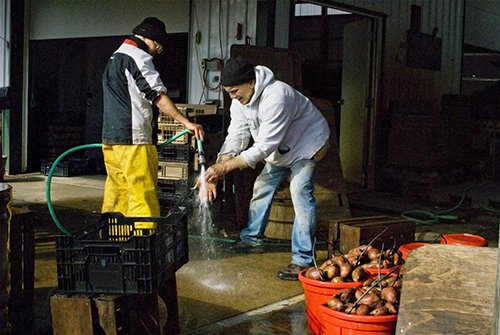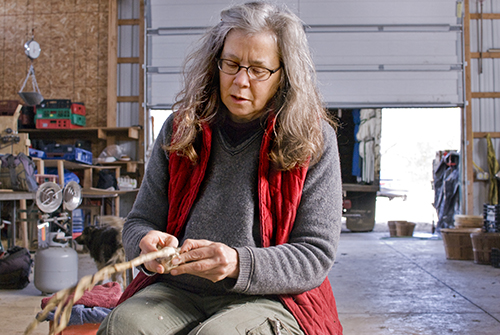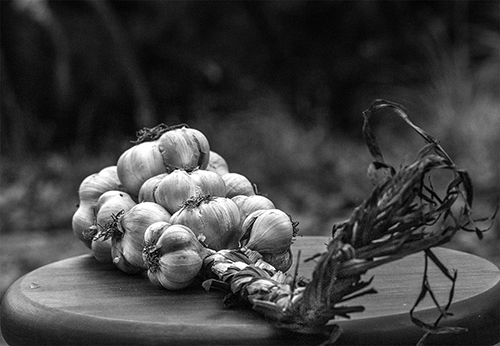
Organic farmer Henry Brockman, left, washes off the soil from the hands of Ted Georgeson, a Chicago area chef who volunteers at Brockman’s farm east of Peoria. Georgeson said he is a descendant from farmers in Greece and working on the land is important to connecting with his heritage and with food. -PHOTO BY CLARE HOWARD
For Henry Brockman, farming is hard manual labor, rigorous scholarship, original research, ethics, poetry and a clarion call that climate change is crashing into our world.
For more than a quarter of a century, there was a rhythmic progression of seasons on Brockman’s farm, an organic operation just east of Peoria. Occasionally, there was flooding from Walnut Creek, but it was gentle. Now flooding comes in torrents across the field, scouring topsoil off the land and digging deep furrows.
There were late frosts and early frosts, but the biodiversity of Brockman’s operation, with 650 varieties of organic vegetables, made those vagaries sustainable. Now he’s been forced to give up on some of the early spring cold-loving plants like sweet shell peas because the season turns from winter to the heat of summer too rapidly. Southern heat-loving plants like okra and peanuts now flourish in central Illinois.
There were droughts, but Brockman was always reluctant to tap into the finite aquifer under his land, contending the aquifer was a societal asset, not one to be exploited for individual gain.
The pace of change, unrecognized by many chemical farmers, has shattered the bucolic progression of the seasons. It was a game changer for Brockman, 55. His plan had been to start slowing down and cutting back, but those plans were hijacked by climate change. Perhaps most alarming is that the pace of change is accelerating. Next year or even the next season are becoming increasingly unpredictable.
With reams of annual field notes and observations, Brockman has documented change that could jeopardize the current industrial food system. But he is not simply observing. He’s making sweeping changes even though he acknowledges, climate change is likely an unavoidable and devastating fate, at this point, for the world.
He is demonstrating that impacting change is within the grasp of everyone. He uses no till and low till, sequesters carbon in the soil, has installed solar panels on his barn, uses minimal fossil fuels, directs rainwater from the roof into a rice paddy, uses no synthetic fertilizers or pesticides and consumes no industrial food.
With more than a quarter century of farming in the Eureka-Congerville area, Brockman does not try to convince chemical farmers they are following a destructive path.
“They don’t talk with me, and I don’t talk with them. But it is no longer politically correct for people in the Ag Department to laugh at us and fail to treat us seriously,” he said.
A new film, “Seasons of Change on Henry’s Farm,” has documented the changes one farmer can accomplish. Brockman’s sister Terra was co-producer for the documentary. Ines Sommer was director, producer and cinematographer.
The film is both beautiful and heartbreaking. It plots a path all concerned people can follow, and it highlights Brockman’s ethical perspective that finite resources are a societal resource, not one to be reaped for individual gain.
Underscoring Brockman’s philosophy is a new academic course of study at Illinois State University, the food studies minor. It is an interdisciplinary examination of the historic and cultural production of food, and the program looks at food justice and sustainability.
ISU Professor Noha Shawki said the program examines the global and U.S. food systems, and how they exacerbate environmental degradation and climate change. The current global food system is not solving problems of human rights violations and ending hunger.
“The food system is broken,” she said.
Her colleague, Professor Gina Hunter, said, “Food justice and sustainability ought to be redundant. We can’t have food justice without environmental justice.”
While researching other university food studies programs, the ISU professors found some stress culinary arts, some sustainability, nutrition or dietetics. ISU shaped its program around food justice and sustainability.
In addition to the interdisciplinary course offerings, the program includes an international studies speaker series with titles ranging from “The Morality of Food,” “Slow Food: Act Globally, Eat Locally,” “Who Will Feed the World?” and “Harvest of Shame: Seeking Justice for Farm Workers.”
The documentary on Brockman delves into his focus of food justice and environmental sustainability. It is currently being shown at film festivals, most recently at the Normal Theater in Normal, Ill. Public screenings will be scheduled in 2020. For more information, go to http://www.seasonsofchangeonhenrysfarm.com.
Brockman said, “People are going on with their lives, ignoring climate change. But we have to think of the survival of children. Changing the way we buy and eat food is an easy change but a powerful way to change the world.”
He laments some changes he’s observed even organic farmers making.
“I’ll probably not grow collards anymore because (due to changes in the seasons) it’s completely decimated by cabbage worms. As farmers, we can adjust and give up and bow to nature or fight nature with plastic row crop covers and ‘organic’ pesticides,” he said. “The first question is the morality and sustainability for the future.
“We are going to lose this battle against climate change, but giving up is not an option.”
For Brockman, farming is a deeply held scriptural belief in justice translated through the language of garlic, arugula and heirloom tomatoes.

Terra Brockman demonstrates how garlic is cleaned for her brother Henry to braid. Braided garlic keeps longer into winter than loose cloves or even heads of garlic. The garlic crop for 2020 has already been planted on the Brockman farm and is blanketed under straw mulch. In spring, twisted, curling garlic scapes will be cut and bundled for sale as one of the first, earliest crops of Midwest bounty. Henry Brockman retains his best garlic cloves each year for planting, so the crop has evolved over his 26 years of farming and has superior nutrition and taste. Brockman also sells “black garlic” that has been slowly dried under regulated temperature and has unique nutritional value and a mild, molasses flavor. -PHOTO BY CLARE HOWARD

A garlic braid made by Henry Brockman.

Recent Comments